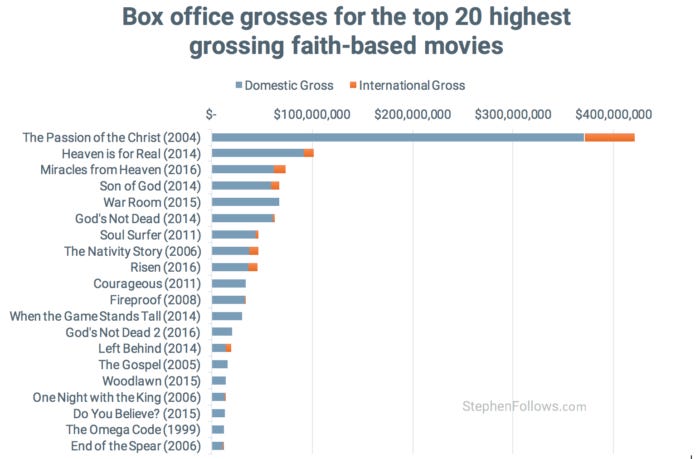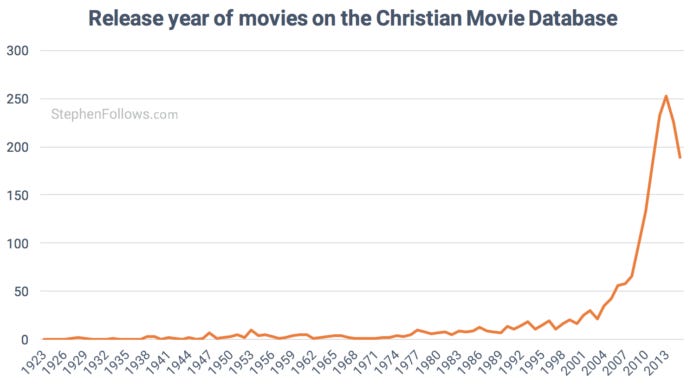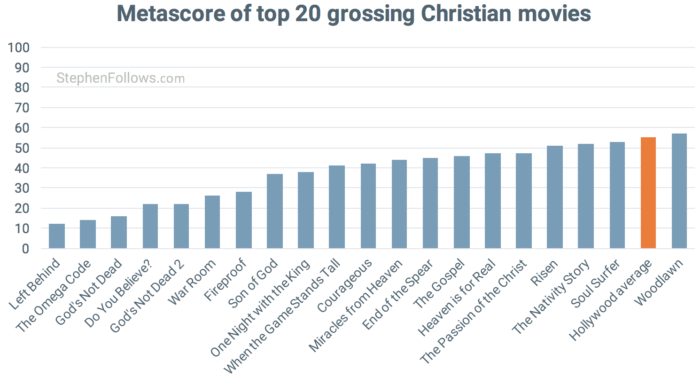The ascension of Christian films
In Cannes this year I noticed a stark increase in faith-based content being offered in the film market. It's a strange sight to see stands offering wholesome Christian films about clean living next to stands offering horror films with all manner of sadism and perversion (I'm not being rude about the horror films - that's quite literally how they sell themselves!)
So I decided to take a look at how the faith-based market is performing: specifically the recent rise in Christian narrative feature films coming out of the bible belt of America. I'm sure this is a topic I will return to in the future as it's fascinating to see such a quick growth in a new market but, for now, let's just look at the biggest films and filmmakers.
Interview with top Christian filmmaker Stephen Kendrick
In the course of conducting my research, I was fortunate to be able to record an interview with Stephen Kendrick, writer and producer of many of the highly successful Christian films that have recently been released. His movies have a combined budget of $6m and so far have grossed over $150m in US cinemas alone.
Let there be light....
Historically, the Christian church and the film industry have largely avoided one another.
Stephen Kendrick describes the church's past opinion of professional moviemaking as "the devil's territory" and "a waste of money". And one can hardly blame them. Hollywood is awash with all sorts of people, activities and vices the church actively preaches against, and few would argue that making movies is the smart, effective way of spending money to change people's opinions.
And the feeling was entirely mutual. Hollywood and the established independent film sector in large part ignored the faith-based market. That's not to say that studios didn't tell stories from the bible, but by the end of the last century the biggest Hollywood films based on Christian characters were either animations (such as the Prince of Egypt) or movies which used religious characters in essentially secular movies (such as Bruce Almighty or The Devil's Advocate). These movies were not made to serve pious audiences and their religious content was rarely regarded as a positive marketing angle.
2004 - The Wise and Foolish ('Passion Of The Christ')
A good example of Hollywood's attitude to faith-based films came in 2004, when Mel Gibson set out to make his epic tale of Jesus' final hours, The Passion of the Christ. At the time, Mel was quoted as saying "This is a film about something that nobody wants to touch... In Los Angeles, they think I am insane, and maybe I am".
The film's star, Jim Caviezel, said in a 2011 Guardian interview that he had "been rejected by my own industry" and that "Jesus is as controversial now as he has ever been. Not much has changed in 2,000 years".
Despite the lack of conventional support, Mel Gibson pushed ahead with the film and The Passion of the Christ has become the most successful independently-financed film of all time. The film cost $30 million and went on to gross $612 million worldwide. In the US, it sold almost 60 million cinema tickets, equivalent to one in four American adults having seen it. This is especially impressive considering that the film includes a lot of extremely graphic violence and the dialogue is in two dead languages!
The success of the Passion showed that a big-scale feature film could perform well, but it wasn't until movies on the other end of the budget scale started to perform that the boom in faith-based movies began in earnest.
2006 - David vs Goliath ('Facing The Giants')
In 2006, the industry finally noticed the work of two brothers who were pastors at the Sherwood Baptist Church, in Albany, Georgia. Alex and Stephen Kendrick had made their first feature film, Flywheel, in 2003, as a church project. Everyone involved was a volunteer, they shot on a prosumer MiniDV Canon XL1s camera and the film's total budget was under $20,000.
The film was screened in a local cinema in Albany, and to the pair's delight word of mouth was strong, leading to a box office gross of $37,000. But it was on DVD that the film truly blossomed, selling over 300,000 units and sparking demand for their next micro-budget feature 'Facing The Giants'.
In what could be seen as luck, God's work or just canny deal-making (depending on your viewpoint) the pair ended up with a distribution deal with Sony Pictures. They had initially just called Sony to inquire about clearing a piece of music but after seeing a rough cut of the film, Sony asked for the distribution rights.
Sony put the film in 441 screens, and it went on to gross $10.2m domestically, impressive considering its modest $100k budget. By contrast, consider two other independent films released the same year - Half Nelson and Brick. The former grossed $2.7m in the US on a $700k budget and the latter grossed $2m on a $450k budget. That means that at the US box office Half Nelson grossed 385% of its budget, Brick 444% and Facing The Giants stands at a whopping 1,020% times its budget.

Movies beget movies
The success of Facing The Giants led to a boom in feature films made for faith audiences in America. The Kendrick brothers followed up with Fireproof (2008), Couragous (2011) and most recently War Room (2015).
https://www.youtube.com/watch?v=mIl-XY9t_Lw
Other filmmakers got in on the act, including God's Not Dead (2014, $2m budget, $63m US gross), Son of God (2014, $22m budget, $68m US gross) and Miracles from Heaven (2016, $13m budget, $74m US gross)
The Christian Movie Database currently lists 2,441 movies, two thirds of which were released between 2006-15.

Obviously, there will be some self-selected bias in their list, due to the fact that movies made in the pre-internet age are only likely to appear if they are still watched or distributed. But even so, the fact that there are six and half times as many movies listed as being released in 2014 than there were in 2004 points to a dramatic increase in faith-based film production.
Most influential Christian films
As with any movie niche, a small number of big hits will be highly influential on the next generation of filmmakers. To look at the impact of the biggest movies within the Christian community, I studied all of the user-created lists on IMDb which refer to faith-based films and used that to create a league table of the most mentioned films.
The Kendrick brothers take four of the top ten spots, with Courageous receiving the most mentions, appearing as it did on over a third of all relevant lists. All of the top 30 films were produced in the past fifteen years.
The table below shows the most mentioned films, along with the percentage of IMDb 'faith-based movie' user lists they appear on.
[table id=91 /]
David in the lion's den
Despite their box office success, most film critics are rather, well, critical of the recent wave of faith-based movies. For example, the Kendrick brothers' most recent movie, War Room, received a Metascore of just 26 out of 100. The Wrap collected some of the nastiest things critics said about the movie:
Michael Rechtshaffen from The Los Angeles Times:
Preachy doesn’t begin to describe “War Room,” a mighty long-winded and wincingly overwrought domestic drama.
Daniel Eagan from Film Journal International:
“‘War Room’ might also have been better if it wasn’t shot like a term-life insurance infomercial, if Alex Kendrick and his co-editor Stephen Hellish hadn’t let every shot last just a beat too long, and if the soundtrack dropped some of its Christian rock anthems.”
Scott Renshaw from Salt Lake City Weekly
“Structurally, the movie is a mess, building to so many different endings it really should’ve been called ‘The Return of the King of Kings.’ And even more troubling is the mix of victim-blaming in an emotionally-abusive relationship and an infantile depiction of prayer that turns God into a genie who gives your husband food poisoning before he can cheat on you.
Tom Russo from The Boston Globe:
“The first couple of acts of the Kendricks’ latest, “War Room,” are so heavy on broad pulpit pounding that it’s challenging to get swept along by the story’s message. It’s only in the late going that the marital drama turns somewhat more authentic, helping to restore a bit of the audience’s, well, faith.”
The average Metascore for the top 20 grossing films (see previous chart) is just 37 out of 100. A few years ago, I studied the 2,000 highest grossing films of the past twenty years, and in that case the average Metascore was 55.

Producers' net prophets
A notable feature of this type of film is the heavy reliance on the US market. In 2015, the 20 highest grossing films earned just 36% of their box office revenue domestically (i.e. in the US and Canada), whereas the top 20 Christian films shown above earned 78% domestically. And that rises to 92% if we exclude the outlier that is The Passion of the Christ.
The fact that the success of these movies is largely based on US appeal makes their rise even more impressive. One would assume that the infrastructure to release and promote these films in other markets will grow, helping them to increase their international takings. Approximately a third of the world population is classified as believing in the Christian faith, suggesting a big untapped market. (That said, Christian doctrine differs around the world so it remains to be seen how this will affect the appeal for these movies).
Cleansing of the Temple
Part of the reason Hollywood has historically ignored the Christian market is the clash of cultures. If the studios wish to claim a larger slice of this business then they will need to navigate the particular moral standards held by the filmmakers behind these faith-based films. As you can hear in the interview I conducted with Stephen Kendrick, they prize their moral standards well above money or influence and so Hollywood's principle weapons (money and fame) may fall on deaf ears.
As it stands right now, the current crop of successful Christian filmmakers spend considerable time ensuring that the people they work with share their religious and moral views. Even Christian heartthrob Kirk Cameron faced a probing interview about this life, his faith and his marriage before being cast in the Kendrick brothers' Fireproof. By contrast, Hollywood's moral code could be best summed up by Groucho Marx who said "The secret of life is honesty and fair dealing. If you can fake that, you've got it made".
In addition, if the Christian market continues to grow at this pace, then it's conceivable that studios may face a choice between being involved with the wholesome market or more salacious markets, such as horror and adult dramas. A sign of what's to come could be the pressure Disney has faced from the Christian right, such as the current petition (with 330,000 signatures) demanding Disney give Elsa a prince charming to fall in love with in Frozen 2 ("#CharmingPrinceForElsa").
Will Hollywood be able to profit from films like Fireproof and Courageous at the same time they distribute The Purge, The Da Vinci Code and Drag Me To Hell? Only time will tell.
Notes on my research into Christian films
For today's article, I have focused on narrative feature films made primarily for a Christian audience. I have therefore excluded films which contain some Christian elements but which were also made with a mainstream market in mind. There is a world of difference between the Narnia films (which are Christian allegories but don't directly mention God or Jesus) and Fireproof (which was created by Christian pastors who describe their work as "sermons through cinema").
I also excluded films which use the Christian belief as a tenant of their narrative, but which don't directly relate to Christian stories or ideas. Examples of such movies include Bruce Almighty (where God is a character but it's fundamentally about one man dealing with unlimited power), The Blind Side (which takes place at a Christian college but the Christian faith does not play a major part in the movie) and Sister Act (which is about singing nuns, not Jesus).
Finally, I excluded horror films which use the Christian faith as part of their premise but would not directly appeal to a faith audience, such as The Exorcist, The Omen and Deliver Us From Evil.
Epilogue
I'm excited to watch what happens next in this unfolding story. Not necessarily because of the faith aspect, nor because I am an avid watcher of the films, but because change in the film business is often very slow. Genre trends come and go (such as the swing back and forth between ironic and horrific horror films), but this is the first time I have seen a whole sub-genre grow at such a pace.
The technological changes in the film industry and in the world of consumers has meant that it's never been easier to make a film and get it to a willing audience. When you add the fact that Christian audiences are highly organised and chronically under-served, it's clear that Christian filmmaking is yet to hit its peak.
Finally, it's also a story of plucky independent filmmakers who had a passion for film and who completely ignored the conventional industry wisdom about what to do. They followed their instincts, strayed true to what they believed their audiences would enjoy and were rewarded for their bravery. It's a story which should have all independent filmmakers chanting 'Amen'.


